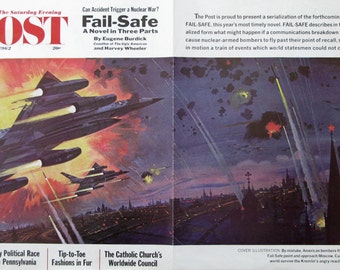Extollager
Well-Known Member
- Joined
- Aug 21, 2010
- Messages
- 9,051
Perhaps there'd be interest in a place where interested people could talk about thrillers written in the 1940s to the early Sixties with an atom-bomb threat element. I'm thinking of works that are marginal as science fiction, such as
Peter Bryant's Red Alert
Philip Wylie's Tomorrow!
Burdick and Wheeler's Fail-Safe*
Pat Frank's Alas, Babylon
(I have to say that I list the first three of these without having read them yet! They certainly seem to be the sort of thing I have in mind for this thread.)
The intended scope of this thread would restrict discussion to fictions set basically in the writer's very near future, possibly dealing with atomic war that doesn't break out but almost does, as well as fictions in which it does. I'm not thinking of stories in which the threat of nuclear missiles, etc. is the McGuffin for a plot in which the adventures of a secret agent or the like are the focus, but rather stories that come more seriously from the Cold War anxieties of the period specified.
This thread is not intended as a place for discussion of the post-apocalyptic genre, which is what most of the books listed here
http://en.wikipedia.org/wiki/List_of_nuclear_holocaust_fiction
qualify as being. There's probably already a post-apocalyptic fiction thread, and if not someone can create one for discussion of books such as Dick's Dr. Bloodmoney, etc. The thread I propose here could accommodate stories such as Frank's that deal with the lead-up to nuclear war and with its immediate aftermath provided the story is set in the writer's immediate future and belongs to the 1940s-early 1960s time frame. No story is acceptable for this thread that starts after the bombs have gone off.
You can see what I'm driving at, right? Stories for this thread would typically be books that would be shelved with the general fiction in a library, not the sf. Short fiction of this type would probably not have appeared in a science fiction magazine. Lester del Rey's "Nerves" would not qualify. It concerns an accident at a nuclear plant, not a bomb.
http://en.wikipedia.org/wiki/MacGuffin
This thread is being proposed by someone who was a kid during the Cold War. I still have a 1962 note from my school about what would be done in the event of nuclear war breaking out.
*I have this one as serialized in the Saturday Evening Post!
Peter Bryant's Red Alert
Philip Wylie's Tomorrow!
Burdick and Wheeler's Fail-Safe*
Pat Frank's Alas, Babylon
(I have to say that I list the first three of these without having read them yet! They certainly seem to be the sort of thing I have in mind for this thread.)
The intended scope of this thread would restrict discussion to fictions set basically in the writer's very near future, possibly dealing with atomic war that doesn't break out but almost does, as well as fictions in which it does. I'm not thinking of stories in which the threat of nuclear missiles, etc. is the McGuffin for a plot in which the adventures of a secret agent or the like are the focus, but rather stories that come more seriously from the Cold War anxieties of the period specified.
This thread is not intended as a place for discussion of the post-apocalyptic genre, which is what most of the books listed here
http://en.wikipedia.org/wiki/List_of_nuclear_holocaust_fiction
qualify as being. There's probably already a post-apocalyptic fiction thread, and if not someone can create one for discussion of books such as Dick's Dr. Bloodmoney, etc. The thread I propose here could accommodate stories such as Frank's that deal with the lead-up to nuclear war and with its immediate aftermath provided the story is set in the writer's immediate future and belongs to the 1940s-early 1960s time frame. No story is acceptable for this thread that starts after the bombs have gone off.
You can see what I'm driving at, right? Stories for this thread would typically be books that would be shelved with the general fiction in a library, not the sf. Short fiction of this type would probably not have appeared in a science fiction magazine. Lester del Rey's "Nerves" would not qualify. It concerns an accident at a nuclear plant, not a bomb.
http://en.wikipedia.org/wiki/MacGuffin
This thread is being proposed by someone who was a kid during the Cold War. I still have a 1962 note from my school about what would be done in the event of nuclear war breaking out.
*I have this one as serialized in the Saturday Evening Post!


